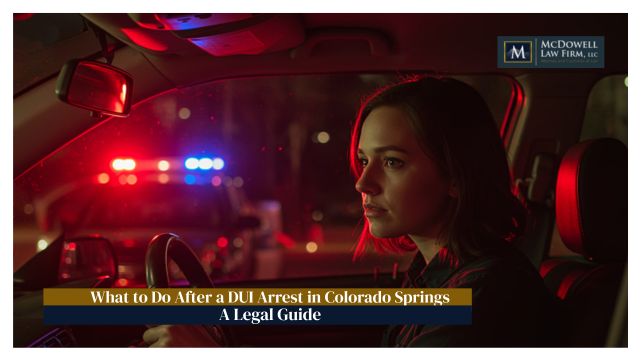In today’s post we’ll cover some common definitions in DUI cases. This week I’m starting right away with the acronyms. In Colorado a DUI (Driving Under the Influence) is an unclassified misdemeanor. It’s a serious offense, with potentially severe consequences.
What is a BAC?
DUI cases often pivot around another three letters: B.A.C., which stands for Blood Alcohol Concentration. This measurement of alcohol in your blood is crucial in understanding not only the legality of one’s driving status but also the physical and mental impairment linked to alcohol consumption.
A driver’s B.A.C. plays a significant role in the prosecution of DUI cases, especially in states like Colorado, where laws strictly define the limits and consequences associated with varying levels of alcohol intoxication.
Understanding Blood Alcohol Concentration
Blood Alcohol Concentration (B.A.C.) is a metric used to measure the amount of alcohol present in a person’s bloodstream. Expressed as a percentage, B.A.C. reflects the mass of alcohol per volume of blood. For instance, a B.A.C. of 0.10% means that an individual’s blood supply contains one part alcohol for every 1,000 parts blood.
The Effects of Alcohol Impairment
Alcohol is a depressant that affects the central nervous system, notably impairing motor skills, reaction time, and decision-making abilities. The degree of impairment correlates with the rise in B.A.C. levels; even a small amount can affect driving ability. The effects range from slight relaxation and lowered inhibition to severely impaired coordination, focus, and judgement, all of which are critical for safe driving.
Legal Implications BAC in DUI Case in Colorado
In Colorado, the approach to handling DUI cases is structured around specific B.A.C. thresholds, which define levels of legal intoxication: DWAI (Driving While Ability Impaired), DUI (Driving Under the Influence), and DUI per se.
- DWAI: This charge is considered if the B.A.C. is in excess of 0.05% but less than 0.08%. While these levels do not necessarily mean that a driver is fully incapacitated, the law states that someone is DWAI if they are “impaired to the slightest degree.
- DUI: Typically, a B.A.C. level of 0.08% or higher leads to a DUI charge. This charge is for when a driver is substantially impaired in their ability to operate a vehicle as a sober person would.
- DUI per se: In Colorado, merely having a B.A.C. of 0.08% or higher is sufficient for a DUI conviction, irrespective of any actual impairment observed. This is known as a “per se” offense, where the level of B.A.C. alone establishes the violation. This is also known as D.E.A.C., “Driving with Excessive Alcohol Concentration.”
Consequences of Different BAC Levels
The penalties for DUI and DWAI in Colorado vary based on the B.A.C. level and the number of prior offenses. Generally, penalties include fines, jail time, community service, and mandatory alcohol education classes. Higher B.A.C. readings, are treated with greater severity, potentially leading to longer jail terms, larger fines, and extended license suspensions.
For example, a B.A.C. in excess of .20 requires a 10-day MINIMUM jail sentence, even on a first offense.
B.A.C. Limits for Minor Drivers
For drivers under the age of 21, Colorado enforces what is effectively a “zero-tolerance” policy, reflecting stricter standards compared to adult drivers. The permissible B.A.C. limit for underage drivers is set at 0.02%. This reduced threshold aims to discourage underage drinking and driving, reflecting the increased risk and potential consequences of such behavior in younger, less experienced drivers. If the BAC comes in between .02 and a .05, the minor driver will be charged with a “UDD”. Certainly a less serious charge than DWAI or DUI, “Underage Drinking and Driving,” also known as a “Baby DUI” can still take a minor’s license and be a stain on their criminal record. The good news is that UDDs are sealable. Contact us to discuss sealing your DUI case.
What is the Highest BAC You Have Ever Seen?
I have seen a BAC in excess of .50 only two times in my twenty-year career in criminal law. I have seen quite a few .40’s, and even more above a .30. The good news is that BACs this high are very rare. When I was a young prosecutor, a defense attorney brought in a case at exactly .50 BAC. I’m sure he saw my reaction of seeing a BAC so high. He said to me, “Josh, you’re going to dismiss this case,” and gave me a smile like he knew something I didn’t. This defendant, based on his history and BAC was looking at a lengthy jail sentence. Defense counsel was right though, I did dismiss the case. Because the next thing defense counsel handed me was the defendant’s death certificate.
Reaching a BAC that high isn’t easy. Most people will be passed out, or in the hospital well before they hit a .40. A person who can reach a .50 is typically an “experienced” drinker that stays intoxicated at most times. I share this story because drinking to excess is incredibly risky from a health perspective but is also dangerous to others on the road.
DMV Consequences
Beyond the criminal penalties, there are significant administrative consequences imposed by the Colorado Department of Motor Vehicles (DMV). A DUI charge can lead to the suspension of driving privileges. Additionally, drivers may be required to install an ignition interlock device on their vehicles, which prevents the car from starting if alcohol is detected in their breath. The officer will only file for an Express Consent Hearing at the DMV if your BAC was in excess of .08%, or you refused to cooperate with a chemical test.
Conclusion
Understanding B.A.C. is crucial for anyone who chooses to drink and drive. It is crucial to always drink responsibly, but if you do make a mistake, there are a few things to remember in closing:
- Generally speaking, the higher your BAC, the more trouble you’re in.
- If you’re underage, even a single beer could put you over the legal limit for a UDD
- If you’re over a .08, or you refuse chemical testing, you will face DMV consequences that can include revocation and the required installation of an interlock device.
Colorado’s tiered approach to handling different levels of intoxication (BAC) through its DWAI, DUI, and DUI per se laws reflects a commitment to reducing alcohol-related accidents. It also recognizes the drunker you are, the more danger you put others on the road in. My advice is to always call a cab after you’ve had anything to drink. It’s better to be safe than sorry. A $40 Uber bill is better than the $10,000 or so, you’ll spend on a DUI conviction.




